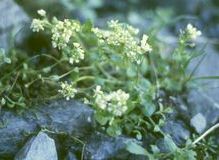|

English Scurvy Grass |
One of the roost useful, but not best known, of the Cruciferous wild plants which are specifics against Scrofula is our English Scurvy Grass.
It grows by choice near the sea shore, or in mountainous places; and even when found many miles from the sea its taste is Salt. It occurs along the muddy banks of the Avon; also in Wales, and in Cumberland, more commonly near the coast, and likewise on the mountains of Scotland; again it may be readily cultivated in the garden for medicinal uses. If eaten as a salad in its fresh state it is the most effectual of all the antiscorbutic plants. |
The herb is produced with an angular smooth shilling stem, twelve or fourteen inches high, having narrow green leaves, and terminating in thick clusters of white flowers. Its leaves are good and wholesome when eaten in spring with bread and butter. The juice, when diluted with water, makes a good mouth-wash for spongy gums.
The whole plant contains tannin, and a bitter principle, which is butyl-mustard oil, and on which the medicinal properties depend. This oil is of great volatility and penetrating power; one drop instilled on sugar, or dissolved in spirit, communicates to a quart of wine the taste and smell of Scurvy Grass.
The fresh plant taken as such, or the expressed fresh juice, confers the benefits of the herb in by far the most effectual way. A distilled water, and a conserve prepared with the leaves, were formerly dispensed by druggists; and the fresh juice mixed with that of Seville oranges went by the name of "spring drinks," or "juices."
The plant is found in large quantities at Lymington (Hants), on low banks almost dipping into the sea. Its expressed juice was formerly taken in beer, or boiled in milk as a decoction, flavored with pepper, aniseed, etc.
This Scurvy Grass has the botanical name Cochlearia, or, in English, Spoonwort, so named from its leaves resembling in shape the bowl of an old-fashioned spoon. It is supposed to be the famous "Herba Britannica" of the ancients. Our great navigators have borne unanimous testimony to its never-failing value in scurvy; and it has been justly noticed that the plant grows most plentifully in altitudes where scurvy is specially troublesome and frequent. The green herb
bruised may be applied as a poultice.
For making a decoction of the plant as a blood purifier, and against scurvy, put two ounces of the whole plant and its roots into a quart jug, and fill up with boiling water, taking care to keep this well covered. When it is cold take a wineglassful thereof three, or four times in the day.
Another name for the plant is Scruby grass. The fresh herb has a strong pungent odor when bruised, and a warm bitter taste. Its beneficial uses in scurvy, are due to the potash salts which it contains. Externally, the juice will cleanse and heal foul ulcers, and ill-favored eruptions.
Herb Simples
The Primitive Simplers presented here show the way of life in other generations, it is not suggested or recommended trying them yourself. |
|
Garden
Herbs
Home
History of Herbs
Herb Gardening
Herbs for Beginners
Drying & Preserving Herbs
Indoor Herb Gardening
Herb Garden
Hints & Tips
Herbal
Cooking
Herb Chart
Using Herbs
Culinary Herbs
Herb
Oil and Vinegar
Herb Teas
Herb Candy
Herb Jelly
Herb Simples
Preface
Introduction
Alphabetical Listing

Trade
Recipes Online
Share your Recipes with others!!
|


